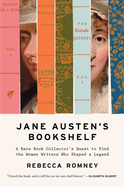
Rebecca Romney (Printer's Error) does some riveting detective work in Jane Austen's Bookshelf, an investigation into the women writers who made an impact on Austen--and why readers know so few of them. Along the way, she asks who gets to decide the canon, how does it evolve over time, and are readers themselves complicit?
Romney is not only an expert antiquarian book dealer and a passionate and knowledgeable reader, but also a marvelous writer. Her journey begins with the 1778 novel Evelina by Frances Burney, discovered on a house call to a collector like herself. Another title by Burney, Cecilia, appears in a passage from Northanger Abbey, a book that Romney has reread a number of times. So why hadn't Romney read Burney, or Ann Radcliffe, or Maria Edgeworth, all of whom are mentioned in that same passage? That passage gives Romney the outline for a new collection: Jane Austen's Bookshelf.
Assembling this collection's criteria (e.g., Austen's favorite women writers; which books and editions; condition; etc.), she notes, "A reader falls in love with the story in the book. A collector falls in love with the story of the book." Romney offers brief bios of Austen and the eight women writers who influenced her enough to earn a place in it, such as Charlotte Smith, who wrote to free her gambler husband from debtors' prison. Many concrete examples emphasize Romney's point about the importance of women's agency in "courtship novels" or the romance genre, as it's called today.
With humor and candor, Romney gives readers much to ponder about a favorite author and why her books are of such importance today. --Jennifer M. Brown

